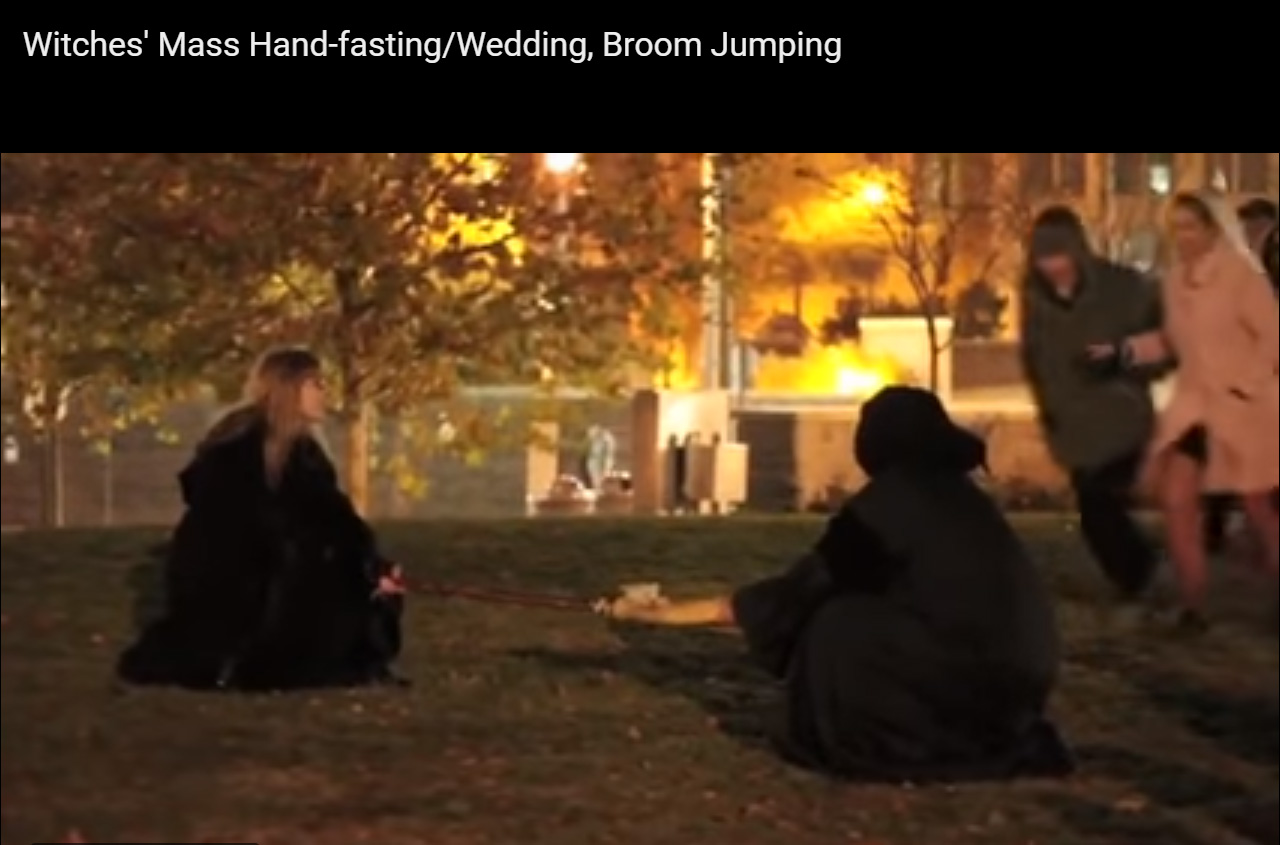
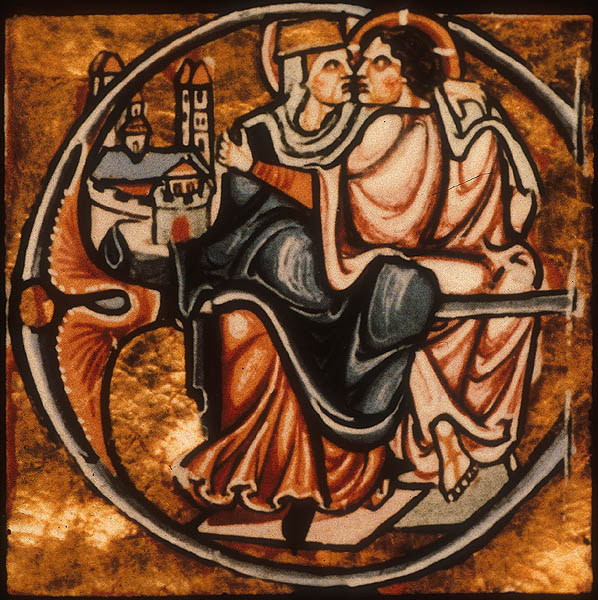 ros is a cunning desperado who defies every moral authority’s attempt to straighten him out. Church-led campaigns to deny legal recognition to same-sex and cohabiting couples only enhance his daring — and expose the hypocrisy of religions that claim to look out for our souls but, when confronted with Love’s innately Pagan spirit, can’t see past our genitals.
ros is a cunning desperado who defies every moral authority’s attempt to straighten him out. Church-led campaigns to deny legal recognition to same-sex and cohabiting couples only enhance his daring — and expose the hypocrisy of religions that claim to look out for our souls but, when confronted with Love’s innately Pagan spirit, can’t see past our genitals.
Whenever a political measure to extend or deny civil rights and benefits to “nontraditional” relationships gains public attention — such as last May’s ballot measure in my state, North Carolina, that imposed the one-man-one-woman definition of marriage on our Constitution — fundamentalists move in and loudly monopolize all religious discussion of relationships. Their “family values” arguments always come down to “original sin” — the doctrine, dating back to the writing of Genesis, that flesh is inherently wicked, and making love for any reason other than making babies is wrong. Hence popes proclaim homosexuality to be an “intrinsic moral evil” (Pope John Paul II in 1986), and preachers condemn cohabiting outside the purifying “sacrament” of matrimony as “living in sin”.
After two decades of co-leading a highly public Witch coven in Asheville, in one of the most religiously conservative areas of the country (a stone’s throw from Billy Graham’s headquarters), I’ve become all too familiar with fundamentalists’ judgments of who’s good and who’s evil — and why. Fundamentalism accurately defines itself as scriptural literalism — the insistence that the Bible, Quran, Torah, or whatever text is revered as the One True God’s sole word on a given subject must be interpreted, not as symbol or metaphor, but as objective and inviolate truth. Fundamentalists claim to judge you by the letter of their law, not by its spirit.
But you’ll get nowhere with them by arguing how subjectively and selectively they pick those letters. It’s pointless to counter-quote those sensuous paeans to erotic love in the Psalms, for example. Literalism is just a symptom of fundamentalism’s obsession with the outer forms of things — their appearance, categories, and labels — and with forcing the seemingly confused and conflicting babel of diversity into the seductively simple, static, black-and-white, God-above-vs.-Devil-below, no-weeds-allowed-in-my-perfect-lawn order that people drawn to fundamentalism crave.
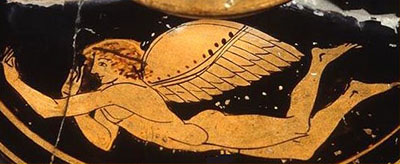
Love’s rebellious disregard for such tidy moral schemes compels religious fundamentalism to reveal the mechanistic mindset that it paradoxically shares with its mortal enemy, scientific materialism. The orthodox religious rationale that love without resulting procreation violates God’s cosmic order is uncannily similar to the Godless genetic reductionism espoused by biologists of the “selfish gene” school of thought who assert that our anguished longings and heartfelt yearnings for one another are nothing but our genes machinating via hormones and pheromones to perpetuate themselves.
So in the end, Extreme Religion and Extreme Science — two ideological poles of modern civilization that are supposed to be diametrically opposed, whose advocates continually battle over fetal souls vs. embryonic stem cells, creationism vs. evolution, divine design vs. random chance — seem agreed on one thing: the dismissal of love. If all that torrid full-moon-serenade, caution-to-the-winds, stuff-of-poetry-and-drama romance doesn’t result in offspring, it’s either spiritually sinful or biologically frivolous. Get back to your cubicles, you lovebirds, and spend your lunch breaks reading your Bible or A Brief History of Time.
Thank Aphrodite, I and my fellow Wiccan priest/ess (and longtime cohabiting partner) are Pagans. She and I, along with the enormous diversity of folks we serve as clergy, can draw from a far older, much deeper and more inclusive well of wisdom about love and relationships than one can find in either of these upstart modern sects.
One of my favorite go-to sages is Plato, the pre-Christian “father of philosophy”, and in particular his teacher, Socrates, whose profoundly Pagan awareness of the unity of reason and mystery radiates from Plato’s writings. Like nearly all practitioners of the world’s countless forms of indigenous spirituality that we nowadays class together as Paganism, Socrates was a polytheist who believed that the divine reflects itself through not just one, but many gods and goddesses; and an animist who recognized that nature is not inert matter, but imbued with soul. His wisdom, however, is not issued as authoritarian judgment: Unlike the lists of commandments laid down like the proclamations of a monarch in monotheistic scriptures such as the Bible and Quran, Plato’s dialogues weave themselves democratically around not only Socrates’s perpetually dissenting questions, but also the diversely opinionated give-and-take of many other individual voices.
The “Symposium”, one of Plato’s most famous works, confronts the controversies of love. Is it merely lust for an attractive body, as materialists then and now maintain? Is it about singular commitment to a soulmate — like the intimate camaraderie between Achilles and his fellow warrior Patroclus? Is homosexuality in fact a nobler form of love than heterosexuality, for the very reason that it does not result in physical progeny? Is love a god, is it madness, or is it both? All these theories are debated freely around the Symposium’s banquet table.
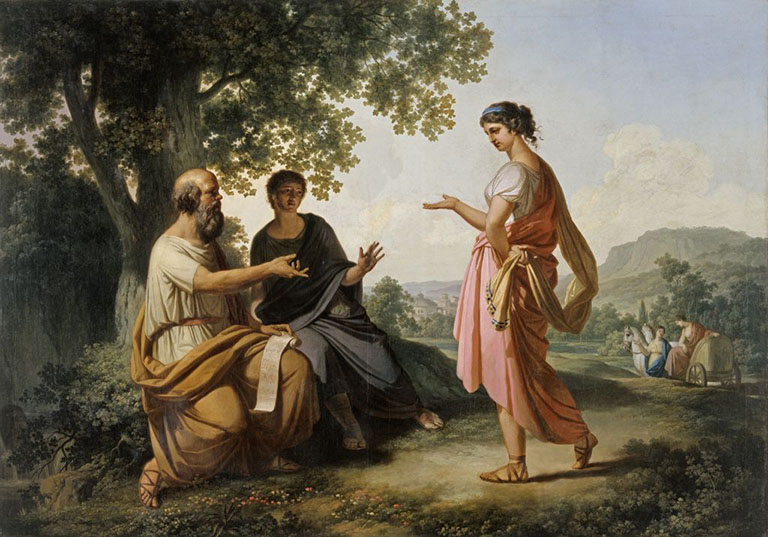
But Socrates gives the game-changing answer to all questions about the nature of love when he recounts a youthful discourse with his first instructor in the ways of love: Diotima of Mantinea, a prophetess — or as we’d now call her, a witch — whom he also credits with teaching him the questioning technique that we now call the “Socratic method”. (Whether she schooled him as well in more intimate techniques goes discreetly unmentioned.)
Love, the witch taught the philosopher, is not a god or goddess, but a spirit who communicates between ourselves and the gods. He is demanding yet crafty, the son of Need and Resource, a determined seeker who gives up everything and stops at nothing in his quest for beauty. Diotima explained that although courtship between man and woman that leads to children and family is admirable, it’s just one of Love’s noble pursuits. Another is procreation of things of the spirit, such as art or law — creating, through the inspiration of one’s relationship with a friend or lover, “something lovelier and less mortal than human seed”.
A would-be initiate into Love’s true mysteries will begin by falling in love with the beauty of one individual body, then with every lovely body — but will not remain content with mere physical lust. He or she becomes smitten with the beauties of the soul, even when it inhabits an unlovely body; then with the interrelated beauties the lover contemplates in laws, institutions, arts and sciences — in every kind of knowledge; and ultimately with the timeless, universal, divine beauty in which all lovely things partake.
In other words, love is the lens through which the beauty of life reveals itself. It’s not a being or thing that exists apart, aloof unto itself like a god who bestows favor from a distant heaven: It exists as relationship, like a spirit that flies between realms. This lens can be clear or cloudy, your relationship healthy or unhealthy to the degree that it connects you with or distracts you from the inner beauty of your beloved — but it’s this intangible essence that matters, not the corporeal form on which your love is focused.
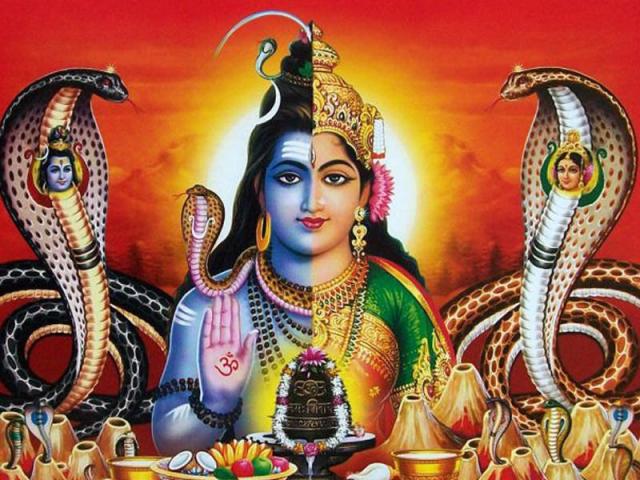
Straight, gay, bisexual, polyamorous … researching cancer, collecting stamps, smoking pot — Pagans don’t categorize whoever or whatever you love by its outer labels and appearances as inherently good or evil. We don’t scour the Almighty’s book of taboos to see if the prophets have banned it along with mixing linen and wool or eating beasts without cloven hooves. In contrast to fundamentalist monotheism, Pagan polytheism encourages pluralism: Accepting and learning to worship multiple gods and goddesses, rather than just one, trains us to seek the inner common threads that run through the world’s outer babel of names, symbols, rituals, cultures, languages, etc. — in short, to judge books by their contents, not their covers.
This doesn’t mean that anything goes as long as it gets you off. For example, things got pretty tricky for the Greeks when they started debating man/boy liaisons. At the time, the upper classes considered it socially acceptable for a wealthy older man to court a handsome young boy as a lover. (If today’s disgraced priests and coaches had been employed in ancient Athens, they would probably still be collecting their drachmas and cornering their adolescent charges in the communal baths.) But the discussions in Plato’s dialogues reveal how controversial the practice really was, especially among parents, because it typically led to sexual and emotional abuse of a trusting child. From various angles Socrates presses his aristocratic listeners to direct their quest for beauty to a boy’s mind and soul rather than his body — to practice what we now call “platonic” love.
As Diotima and Socrates pointed out, it’s not about whom or what you love, but how. Love turns ugly and meaningless when a lover exploits the object of love for selfish ends. Harm none, and treat others as you would be treated — as ends in themselves, not means to your own — is a Pagan ethic of compassion that can’t be commanded, but comes naturally when you begin to care more about people’s hearts than their breast sizes. It’s the same advice lovelorn singles receive: If you want him/her to return your messages, you must value them as a person, listen to them, ask them about their day, and mean it.
In contrast with materialists and monotheists, this wise ethic of Love also informs Pagans’ animistic relations with Nature. If carpentry is our passion, we don’t treat a tree as mere board-feet of lumber to be milled in whatever way the almighty market dictates to maximize profit. Nor do we look down on it as a baser creature than ourselves, to be chainsawed without a qualm because “the Lord” granted Man dominion over all creation.

Instead, woodworkers whose values are Pagan strive to honor the life and soul of the tree. Before chopping down its body, they follow the widespread ancient tradition of making a prayer or offering to its indwelling spirit. When cutting or carving it, they respect its unique qualities of color, grain, strength, etc., courting and coaxing the wood to reveal its inner beauty. When its designated use is done, they strive to recycle it for new uses rather than callously discarding it in a dump. From the beginning to the end of his or her relationship with the tree, a pious Pagan treats it with love.
Still, Eros is a restless rogue. If untempered by conscience or compassion, he can trample family, friends, and colleagues like a rampaging bull to reach the latest object of his obsession. Marriage is not just a personal ceremony of commitment — it’s also society’s effort to protect itself from desire run amok, constraining it by the timeless magic of oaths, talismans, and spells. Brides and grooms swear a vow of commitment before a representative of universal law and justice — whether a religious priest or priestess, or a secular judge, ship’s captain, etc. The oath is sealed with a symbol of binding — whether a gold ring, a knotted ribbon, etc. And they participate in ritual acts to bless their crossing of this new threshold in life — whether jumping a broom to grant them partnership, cutting a cake to forfend hunger, smashing a glass to remove hardship, etc.
The central purpose of all this matrimonial magic is to secure the heart-to-heart vow that is still sometimes referred to as a “pledge of troth” — a promise of mutual trust. Such compacts are, after all, the invisible ligaments that bind society together like the gravitational forces that bind the planets to their orbits — from the “full faith and credit” that backs a federally secured mortgage, to the “oath of office” administered to those we entrust with making and enforcing laws, to the “truth, the whole truth, and nothing but the truth” we vow to testify to in a court of law.

The way Pagans see it, as long as pledges made are honorably upheld, society’s need for stability is fulfilled. It doesn’t matter what genders the wedded troth-keepers are, nor whether they are a couple or a triple or a harem: What counts is their fidelity to one another, and their refusal of temptation to break the bond by lying to or cheating on one another. By contrast, it generates social chaos and instability when fundamentalist-influenced voters and lawmakers impose needless stress on a relationship by denying the partners in a mutually committed gay, common-law, or polyamorous marriage the right to participate in civil benefits granted to other couples solely by virtue of their being one man and one woman, granted one seal of approval.
It also frays the social fabric to insist on tying the bond so tight that it threatens to suffocate the participants. Vowing to unite “till death do us part” is a remnant of days now distant for all but the wealthiest among us, when a formal marriage cemented political and economic alliances between two families, clans, or kingdoms — when wars and fortunes might ride on the question of which bride had the most to offer, which child of the union was the “legitimate” heir to the bloodline.
Put bluntly, these days it’s spiritually unconscionable to insist, as I’ve seen religious conservatives do, that divorcing in order to leave an abusive, irreparably troth-broken marriage is more immoral than preserving matrimonial bonds — to elevate, once again, the outer form of the relationship beyond its inner purpose. And in today’s atomized “hookup” culture, it’s irresponsible for clergy to categorically condemn all sexual exploration unless it leads to lifelong commitment and childbearing.
As Wiccans, Lady Passion and I are empowered by our religious tradition to bond lovers in an ancient, much more flexible form of trial marriage called “handfasting”. For a year and a day, each vows to “cleave to you and to you only, as long as love be in our hearts”. At the end of this time, they can renew their vows, make them permanent, or sever the relationship and formally “handpart” as friends. (My partner and I have been renewing our vows for nearly 20 years and 20 days so far.)
As clergy, we are also empowered by our state’s law to sign and seal the document that makes a marriage official — but only for one man and one woman, for life. That restriction is, in our view, an outdated and unconstitutional imposition by the government of fundamentalist Christianity’s misconception of what constitutes love and marriage.
That’s why, this Halloween [2012], Coven Oldenwilde will be devoting Asheville’s 18th Annual Public Samhain Witch Ritual to protesting this law — and casting a spell designed to change it — by conducting a mass wedding, handfasting, and vow renewal for lovers of any gender or number in front of our county courthouse (where our county commissioners recently refused to extend anti-bias protections to homosexual county employees).
The rite’s theme, “Love is the Law,” alludes to the magician Aleister Crowley’s famous seven-word declaration, which captures Pagans’ inclusive yet intimate understanding of that spirit child of Need and Resource who cannot be tamed, yet flourishes when channeled:
“Love is the law, love under will.”
Steve Rasmussen (*Diuvei) is the High Priest of Coven Oldenwilde in Asheville, NC, and co-author of “The Goodly Spellbook: Olde Spells for Modern Problems” with his partner and High Priestess, Dixie Deerman (Lady Passion). To contact him or learn more about Wicca and the Samhain Public Witch Ritual, visit: www.oldenwilde.org.


